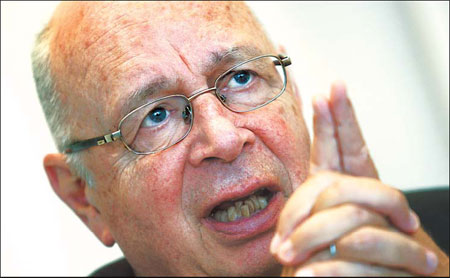The nation will emerge from the depths of the global downturn first and in better shape than any other country, according to Klaus Schwab, who made the observation while stressing the need for more global cooperation to combat the recession.
 |
|
Klaus Schwab, founder and executive chairman of the World Economic Forum, says China is performing better than others and will come out of the economic crisis first. [China Daily] |
"We can be very confident that China's growth objective will be achieved," said the founder and executive chairman of the World Economic Forum (WEF) in an exclusive interview with China Daily.
When Chinese Premier Wen Jiabao announced, at the WEF's annual meeting in Davos earlier this year, that the Chinese economy would grow by 8 percent, in spite of the worst global economic crisis in decades, many were skeptical. But the doubters are fewer in number now, with the Summer Davos meeting set to open today in Dalian, Liaoning province.
The session will bring together more than 1,300 key representatives from industry, government and think tanks to debate and define the course for "relaunching growth", the theme of the summit.
Wen is expected to deliver a keynote speech at the meeting today.
A 4-trillion-yuan stimulus package, backed by a proactive fiscal policy and unprecedented credit supply, has already allowed the Chinese economy to accelerate from 6.1 percent Gross Domestic Product (GDP) growth in the first quarter of the year to 7.9 percent in the second.
The National Bureau of Statistics is set to release key growth figures for August tomorrow. They are widely expected to underpin even stronger economic expansion.
"The fact that the growth objective has been achieved underlines that China is performing better than others and will come out of this crisis first," said Schwab.
Wang Xiaoguang, director of the macroeconomics division under the Institute of Economic Research with the National Development and Reform Commission, agreed.
"There has been no doubt about the goal of the Chinese GDP growing by 8 percent this year," he said. "But what concerns us more is how China could achieve stronger growth two or three years later, when the nation has finished the economic restructuring as planned. Then, the growth must be brought back up to the level before the financial crisis broke out."
From 2003 to 2007, China's GDP growth hovered at more than 10 percent, then, impacted by the financial crisis, GDP growth fell to 9 percent, the lowest in seven years.
Schwab said a full global recovery will lag behind the rebound in China.
"I feel we are not yet completely out of the crisis," said Schwab, who noted there were signs the world economy had not put the worst of the crisis behind it.
He emphasized the danger of huge debt burdens taken on by some Western countries, impediments that will keep growth low and add inflationary pressure.
"China is in a more comfortable situation because China has growth and a strong saving rate, which helps deal with that problem," he said.
Gao Huiqing, a professor at the State Information Center within the National Development and Reform Commission, said a high saving rate "helps us a lot when the economy slows down, but when the economy is back to normal, an unreasonably high savings rate would be a problem".
"China should be making more of an effort to spend more on creating a sound social welfare and healthcare environment, to encourage its people to spend more," Gao said.
Schwab said the slump has driven home many lessons.
"I think the crisis has shown us that we need more global cooperation, we need better cooperation between businesses and governments, better economic systems, without having a negative impact on the innovation power of companies."
China's exports have been hurt because of sluggish economies in the US and Europe.
"The way the Chinese economy will go, partly depends on its exports and they rely upon the world economy, so China and the rest of the world need to join hands and work together for their mutual benefit," said Gao.
(China Daily September 10, 2009)